#1916 rebellion
Text
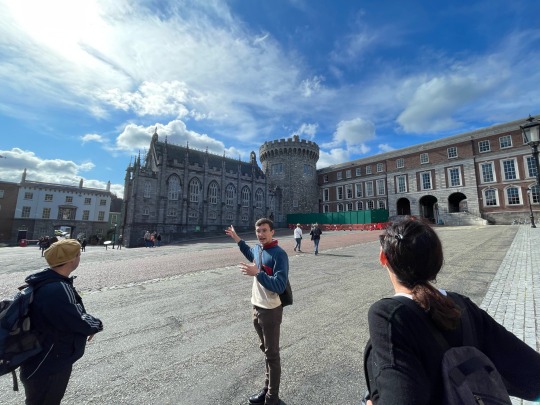
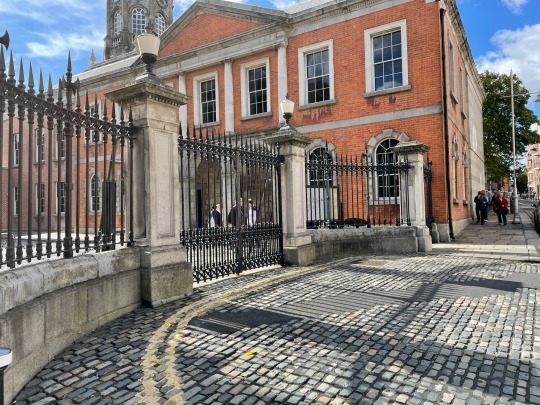
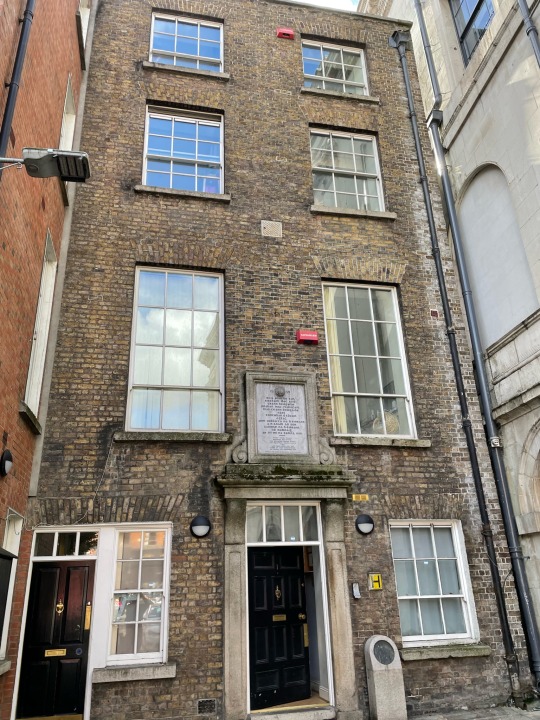

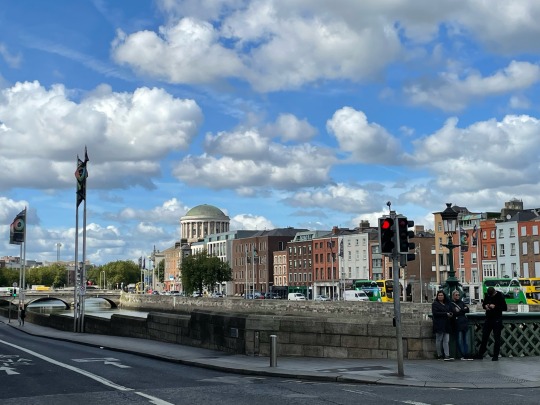
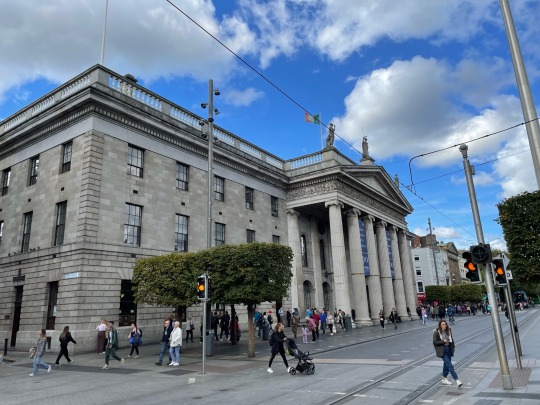
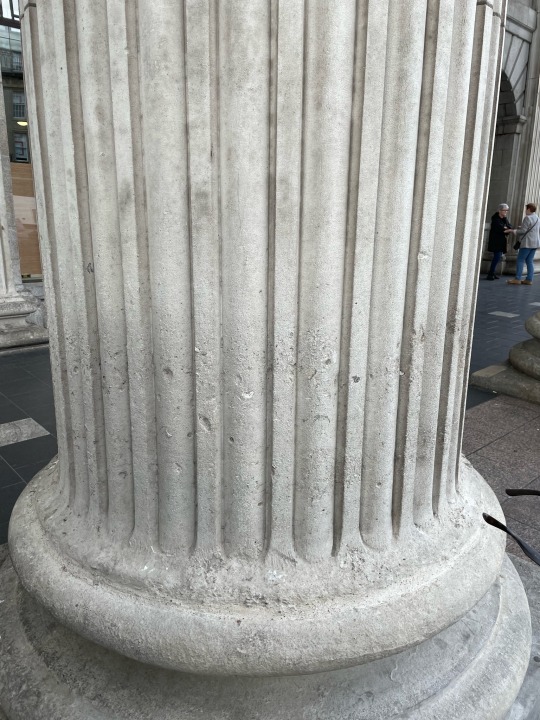
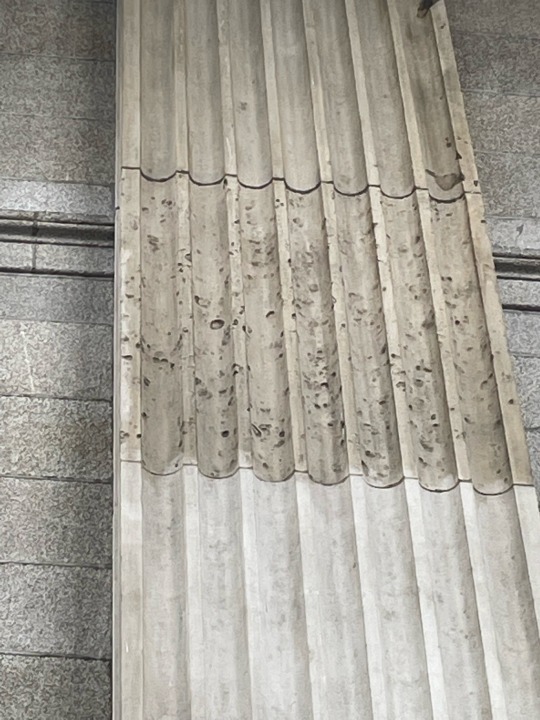


Today I closed out my visit to Ireland with a tour I have long anticipated: a walking tour of the 1916 Easter Uprising.
It’s no exaggeration to say that this event is when modern Ireland was born. The Easter Rising lasted only five days and ended in failure, but it’s effects were far reaching. In fact, all the rebel leaders knew it would end in defeat, but they chose to do so anyway in the hopes of sending a message to both the British who put them down and to Irishmen nationwide.
Irishmen hold men like Padraig Pearse and James Connolly as we Americans view George Washington or Thomas Jefferson. Standing where the proclamation of an Irish Republic was read out is no different from standing in Independence Hall or on the fields of Gettysburg.
The story of the Easter Rising is one of heroism, tragedy, and patriotism. A story of a nation striking out for freedom. A story of men who laid down everything for a cause, a cause that would eventually be realized in the eventual independence of Ireland.
And it’s a story that I intend to tell in a future novel. ;)
With this, my time in Ireland comes to an end, but I won’t be coming home just yet. I’ll be making a stop in Iceland for one day to see all it has and finally returning home.
Pictured: Dublin Castle, Cork Hill gate, Four Courts seen from Gratton Bridge, and the General Post Office (GPO).
#historyman's musing#ireland#vacation photos#photos#dublin#easter rising#1916 rebellion#Easter rebellion#1916#irish history#20th century history
3 notes
·
View notes
Text
Kilmainham Gaol
Kilmainham Gaol is one of the largest unoccupied gaols in Europe, covering some of the most heroic and tragic events in Ireland’s emergence as a modern nation from the 1780s to the 1920s. Attractions include a major exhibition detailing the political and penal history of the prison and its restoration.
Located approximately two miles outside of Dublin city centre, it was built as a county gaol to…
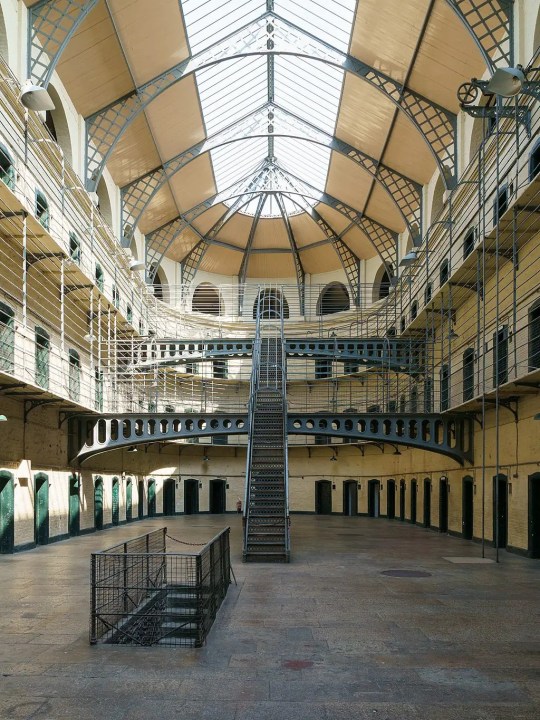
View On WordPress
#1798 United Irishmen Rebellion#1916 Easter Rising#Dublin#History#History of Ireland#Ireland#Irish Civil War#Irish History#Irish War of Independence#Kilmainham Courthouse#Kilmainham Gaol#Office of Public Works#OPW#Thomas Francis Meagher
27 notes
·
View notes
Text
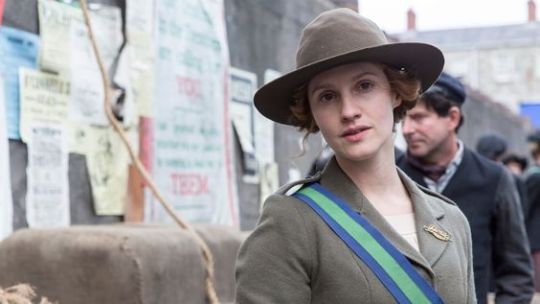
Rebellion (2016) Young Guns
S1E1
A group of young men and women in Dublin in 1916 are embroiled in a fight for independence. For our young protagonists the world will never be the same again.
*Frances O'Flaherty is seen painting an "Irish Republic" flag. This flag was actually sewn by Mary Shannon and painted by Theobald Wolfe Tone FitzGerald and flew above the GPO during Easter Week. After Easter Week, it was seized by British Soldiers and kept in the Imperial War Museum in London. It was returned to Ireland as part of the 50th anniversary commemorations. The flag is now in the National Museum of Ireland.
#Rebellion#2016#Young guns#S1E1#drama#history#war#period drama#Ireland#Easter rising#revolution#1916#Dublin#just watched#Ruth Bradley#tv series
0 notes
Note
Hi! So this is gonna sound weird, but I’ve kinda been learning about Irish history backwards? Like, I started with the Troubles (bc of family involvement), then back to the 1916 rising which got me more interested in the people involved which took me further back and etc etc. I know I’ve been doing it “wrong” but I’m just starting to come up to the 1798. Do you happen to have any recommended readings or particular persons of interest to read? Any collections of primary sources would be more than welcome!
Secondary sources I would recommend:
The Year of Liberty by Thomas Pakenham - about the rebellion in general
The People's Rising by Daniel Gahan - about the rebellion in Wexford
The Summer Soldiers by ATQ Stewart - about the rebellion in Ulster
Wolfe Tone: Prophet of Irish Independence by Marianne Elliott - about Wolfe Tone
The Life and Times of Mary Ann McCracken by Mary McNeill - technically this is just about Mary Ann but I think it's pretty good for Henry Joy McCracken too because there aren't many biographies of him
Orangeism in Ireland and Britain 1795 - 1836 by Hereward Senior - obviously exercise caution on whether or not you think you can mentally handle this subject but book about loyalism during 1798
Castlereagh: War, Enlightenment, and Tyranny by John Bew - about Lord Castlereagh
2 things that I would also recommend reading about for context are the French Revolution and the British radical movement of the late 18th century. for the French Revolution 1 book I would say is good is Liberty or Death by Peter McPhee and for the British radical movement... the book The English Jacobins by Carl B Cone does a good enough job
Primary sources:
The Memoirs of Theobald Wolfe Tone by Theobald Wolfe Tone - title is pretty self explanatory. It's Tone's account of his own life + his diary
The United Irishmen, Their Lives and Times by RR Madden - this is considered to be the 1st history of the rising & was written with the help of many people who lived through it, so it includes a lot of first hand accounts. HOWEVER. beware that Madden was your archetypical mid 19th century Catholic Irish nationalist and the bias created due to that shows through in every single part of these books
Memoirs of the different Rebellions in Ireland by Sir Richard Musgrave - this is another very early history of the rising, also written with the help of people who lived through, also including a lot of first hand accounts. HOWEVER. Musgrave is like Madden's Orange counterpart in that this book is also wildly biased and should also be read with a degree of caution
Personal Narrative of the "Irish Rebellion" of 1798, Sequel to Personal Narrative of the "Irish Rebellion" of 1798, and History and Consequences of the Battle of the Diamond by Charles Hamilton Teeling - 3 accounts of politics in Ireland in the 1790s written by someone who as a young man led the Catholic paramilitary the Defenders
The Drennan letters (a collection of letters that Belfast doctor William Drennan and his sister, Martha McTier, wrote to each other between the 1770s and 1820s), if you can find them, are another great primary source on both the United Irishmen & on what life was like back then in general, as are the McCracken letters, which I know are available free online somewhere I just can't remember where exactly I got the pdf from
There are a lot of them but if you're interested in primary sources you might also read some of the political pamphlets/books that were going around back then -- the most famous that come to mind in this context are Wolfe Tone's Argument on Behalf of the Catholics in Ireland, Thomas Paine's The Rights of Man, and Edmund Burke's Reflections on the Revolution in France but there are wayyy more than that and at least some of them are on the internet archive
194 notes
·
View notes
Text
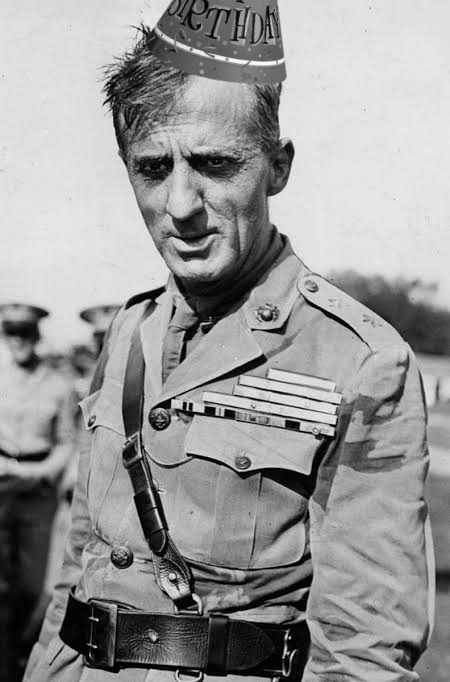
Happy birthday, Smedley Butler! (July 30, 1881)
A career US military officer, Smedley Butler was born to an English-American Quaker family, the grandson of two Pennsylvania politicians. Butler lied about his age to join the Marine Corps during the Spanish-American War in 1898, and spent the next 33 years as a Marine, rising through the ranks to achieve the position of Major General. He served through the Spanish-American War, Philippine-American War, Boxer Rebellion, and the Banana Wars in Latin America, and became intimately aware of the nature of American militarism to serve imperialist and capitalist interests, something which increasingly disgusted him. After his service, Butler became a touring speaker against militarism, writing the pamphlet War is a Racket. He also helped to expose the Business Plot, a scheme to depose President Franklin D. Roosevelt and install in his place a fascist and corporatist dictatorship in the United States. He died in 1940.
"I helped make Mexico and especially Tampico safe for American oil interests in 1914. I helped make Haiti and Cuba a decent place for the National City Bank boys to collect revenues in. I helped in the raping of half a dozen Central American republics for the benefit of Wall Street. I helped purify Nicaragua for the International Banking House of Brown Brothers in 1902-1912. I brought light to the Dominican Republic for the American sugar interests in 1916. I helped make Honduras right for the American fruit companies in 1903. In China in 1927 I helped see to it that Standard Oil went on its way unmolested. Looking back on it, I might have given Al Capone a few hints. The best he could do was to operate his racket in three districts. I operated on three continents."
230 notes
·
View notes
Text
Songs about Ireland / In Irish that I would recommend EVERYONE to listen to.
Firstly, we have Sinéad O'Connor's song 'Famine'. Sinéad was an Irish singer-songwriter and a prominent activist. A very interesting figure, who wrote beautifully poignant songs on issues Ireland faced in the 90's in particular, but these songs still remain very relevant today. This song deals with the truth behind the so-called famine in Ireland, and has been deemed controversial since Sinead first performed it.
Of course, next we have Hozier. 'Butchered Tongue' is a wistful song about the decline in the Irish language and Irish culture. It also touches on the pitchcapping of Irish Rebels during the 1798 rebellion against the british. Yes I cried when hearing this song for the first time.
Another Hozier song, that actually surprised me a lot, is 'De Selby (part 1)'. This song is the first time I have heard the Irish language in a song by a globally popular artist. The idea that this song was played, that Irish was played across the world still amazes me. See my translation for this song here. This song is incredibly beautiful.
A band that sings in Irish is Dysania, and I would really recommend their song 'Lasú Croí'. The song slaps, and they are incredible for keeping our language alive through modern music. I'd also recommend 'Bothar Briste'.
Another band that sings as gaeilge is IMLÉ. I'd recommend 'Éad' and 'Go Deo, Go Deo.' Their songs are incredibly moving, 'Go Deo, Go Deo' kinda reminds me of a calmer version of 'Army Dreamers' by Kate Bush.
'The Town I Left Behind' is also a classic song that practically every Irish person knows. I would personally recommend The Dubliner's version. As well as this I would recommend listening to 'Grace', and 'The Foggy Dew'. All these songs deal with Ireland's history in some way - from the troubles to the 1916 rising.
'Isle of Hope, Isle of Tears' is another well-known song that I particularly remember learning in primary school. The Irish-Americans might be interested in this one - it's a song about the mass immigration to America during the Famine.
#Feel free to name more in the notes!#Gaeilge#gaeilgoir#irish#ireland#eireann#Éire#irish music#ceol#Ceol as gaeilge#Gaeilgoir
47 notes
·
View notes
Text
Nevermore: Morella Theory/Headcanon
I am very obsessed with Morella and the fact that Irish history and culture plays into her character, it's something that I'm very passionate about!!! (this likely won't be the last time I rant about her)
without further ado:
okay so based on Morella's spectre and also that many of the cast are theorised to be from the 19th/20th centuries, I believe that she could've died protecting a civilian during the various conflicts that occurred in Ireland during the 19th Century:
Easter Rising, 1916
Irish War of Independance, 1919
Irish Civil War, 1922
The Troubles, 1969
it's also possible that she died in a smaller scale conflict, such as those that occurred during the deployment of the British Parliamentary Force (Black and Tans) who were sent to squash the rebellion. They were particularly known for destroying civilian property and attacking civilians
But yeah as well with Morella's spectre being designed around battle, with armour, sword and shield, I think she could've died protecting someone while fighting
edit: after reading the short story Morella's name comes from there's basically nothing that lines up with my theory haha, but I still like the idea.
in the story she died in childbirth which makes me think of the Magdelene Laundries that operated from the 18th to 20th centuries but it wouldn't relate much to the armour.
but yeah if anyone has any other theories pls lmk!!
#nevermore webtoon#nevermore#morella nevermore#nevermore morella#nevermore headcanon#myst mr crow ranting#she is so dear to my heart
67 notes
·
View notes
Text
Loves Revolution
Chapter 1
Pairing: Bradley Bradshaw (as Micheal Collins) x Jake Seresin (as Harry Boland) x OC! Madison Cassidy
Word count: 3.2K
A/n: This is the first post to my new series so please be nice! I'm going to try to make this into a series so please show this story a bit of love and reblog!
Summary: Bradley, Jake and Maddie have been friends for many years ongoing. Bradley from Cork and Jake and Madison from the troubled Dublin, have been close for life. Now fighting in the 1916 Easter rising and the ongoing history to the Treaty and the independence of Ireland their story lives on...
History: Bradley (represents) :Michael Collins (October 16, 1890 – August 22, 1922) was an Irish revolutionary, soldier, and politician who was a key role in the early twentieth-century campaign for Irish independence. During the Irish Civil War, he served as Director of Intelligence for the Irish Republican Army (IRA) and as a government minister in the self-proclaimed Irish Republic. From January 1922, he was Chairman of the Provisional Government of the Irish Free State, and from July till his death in an ambush in August 1922, he was Commander-in-Chief of the National Army.
Jake (represents) :Harry Boland (April 27, 1887 – August 1, 1922) was an Irish republican politician who led the Irish Republican Brotherhood from 1919 to 1920. From 1918 until 1922, he was a Teachta Dála (TD).He was elected as the MP for Roscommon South in the 1918 general election, but, like other Sinn Féin candidates, he did not serve in the British House of Commons, instead sitting as a TD in the First Dáil. Boland was elected to the second Dáil as a TD for Mayo South-Roscommon South in the 1921 general election. He was re-elected as an anti-Treaty candidate in 1922, but he perished two months later during the Irish Civil War.
History :The Easter Rising (Irish: Éir Amach na Cásca), often known as the Easter Rebellion, was an armed insurgency in Ireland in April 1916 during Easter Week. While the United Kingdom was waging the First World War, Irish republicans started the Rising against British control in Ireland with the goal of establishing an independent Irish Republic. It was Ireland's greatest important insurrection since the 1798 rebellion and the first armed battle of the Irish revolutionary period. Beginning in May 1916, sixteen of the Rising's leaders were executed. The executions' nature, as well as following political developments, eventually contributed to an upsurge in popular support for Irish independence.
Warning: Mentions of gun use, ptsd, mentions of death, mentions of shooting, flirting, mentions of abuse, description of dead body, death, blood
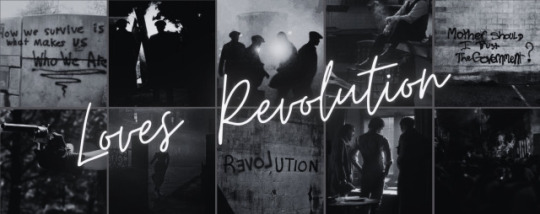
Year 1916, Easter
"Sir, we got the General Post Office surrounded, Sir! We believe that inside are De Valera, Macdonagh, Clark, Connolly and a lot of other rebellions, sir!" One of the funny dressed British soldiers replies to their head commander, with hand at forehead, ready for a salute. This is how the English planned it all along, for the most important rebellions to be stuck at one place, surrounded with no escape.
"So we have the G.P.O, good, very good, but what about O'Connells street, Stevens green, The Liffey and the four courts?" The head commander asked the young man who still held his hand above his head, not moving an inch. "The areas are empty, sir! Either captured or escaped but the rest are at the G.P.O, sir!"
They're all where they were supposed to be, all in one place, no room to escape and they'll give in to this nonsense, they had no way to continue fighting against the British or loyal Irish. The undertakers or loyal Irish were against the rebellions, fighting against them at this very moment, all they had to do now is give themselves up to the English.
"Are there any women inside, lieutenant?" Any innocent woman that had been stuck inside the G.P.O that had been inside the building for the past five days, did not deserve the faith they may face in several minutes from now. The soldiers aligned outside of the building will not hesitate to kill anyone on the inside but the women didn't deserve it.
"There's women of aid and very little volunteers, sir! We believe that one of the fellow female friends of De Valera's help is inside the building. Her parents put her off name Madison Cassidy, but to the public she's known as 'Maddie', sir!" A woman so apparently known to the public but how? No woman that the commander has heard of went by that name or was 'known to the public', no woman has ever had the might or power to be so known in the streets of Dublin or the county of Leinster. "What do you mean 'known to the public', lieutenant?" "She's a public speaker, sir!"
A female public speaker? And that was apparently known to people. Absurd. An absolute absurdity. Some young girl, that he has never heard of decided to become a public speaker. What a joke! She should be scrubbing the dishes, washing the linen, taking care of the kids or cooking and not wasting her time over public speeches. And who would even listen to her? Some sort of female, trying to put her thought into a speech that is apparently supposed to motivate people to do something.
And she believes that's gonna work, but like the lieutenant mentioned, she did work with De Valera. "Bring her to me, nobody lay a finger upon her, understood?" "Yes sir!"
---------------
The gun shots echoed in your ears. It was a sensation as if your ears were violently and rapidly ringing, due to the awful noises that have been haunting your brain for the past five days. You've been in the G.P.O for so long and at this point, it felt like you haven't left in centuries.
You're hiding behind a big, destructed pillar at the moment, leaning your back against it, catching your breath. There was no way out, there was English all around the grand building and mostly everything inside was burning and what didn't make it better is the roof, it's too weak to hold more racket. Even if the English didn't manage to get you guys out, the roof looked like it was only gonna last two more days before swallowing all of you.
"Maddie!" Bradley's voice, called out as the rebel has been looking for you. Him and Jake have been shooting from further up front of the building and now you were unsure if to answer. You couldn't fight more, even though it was written in your blood to fight for the right of being an independent country. But now Leinster, Munster, Connaught and Ulster should forgive you but you've had enough.
"I'm here!" You call out from behind the pillar, Bradley immediately runs over to you, diving behind the pillar like you did as a shelter from not getting shot.
"We're giving up," he told you, those baby cow eyes never dropping your gaze, not even for a second. "What?" You couldn't believe it. You guys destroyed Dublin. The streets of your hometown were in ruins from this rebellion, just so you could give up. That was bloody nonsense.
"They got us surrounded, we have no choice but to give in." "Bradle-" He cut you off, he knew you'd argue or do some sort of disagreement but there was no other way. "I know Maddie, but we had a meeting upstairs and there's nothing we can do they have the four courts and Stevens green and the rest. We have to make it out alive and this is not a step towards that."
You look over the pillar to see men on your side fighting, tired wrecked and most likely depressed. They're not going to make it out alive if we don't give up but if we do they'll probably be shot, either way.
"BRADSHAW!" De Valera calls out, with his old, crispy sharp voice. Sounds like a snob but is the chief, the man everyone listens to and who is leading your group forward. He had to go, you wonder how or when they're going to give up but he lays a soft, delicate, quick kiss on your cheek and gets up and runs towards Jake to help. Jake looks like he had enough.
The building's broken architecture, dust has covered his body and he looks wrecked. He looked over at Bradley running and quickly yanked him behind to a standing pillar up front of the G.P.O. The military has brought in machine guns, full loads and everyone crouches down with full might trying not to get shot. You all were going to die, you knew it. Either shot now or shot later is how you're all going to end, just each had to decide what's best for themselves.
For a full ten minutes of nonstop shooting, the military guns stopped, waiting for a reaction out of the rebellion group. They were going to give up now, you knew it. Dev and the rest ran over to a soldier and wrapped a white flag around his shotgun and told him to head up front.
This is the sign of the rebellions giving up. This was the sign to signify that you guys had enough. One by one they leave the building and you get up from behind the fallen pillar and run to the exit. The second you reach behind De Valera, Bradshaw and Seresin you could tell they were going to give up and this was the end for them.
You stand behind them as the English General calls out orders, "FOUR STEPS FORWARD!" You all do as told. "DROP YOUR WEAPONS!" Anyone who held a gun or anything of that sort does as they're told. "NOW, TWO STEPS BACK!" And that was the last order till the round up.
---------------
An English General was calling out English rebellion names, one by one, dragging them out of the crowd by his ugly cane. "McDonagh. Thomas Clark." Both were dragged out of the crowd by the bloody officer. Each name was dragged out in his tongue and then the actionist was dragged out of the group, except one injured man, Connolly, who was lying down due to a leg wound and instead he was just kicked and carried away on the cloth stretcher.
"Get up, you Fenian swine. Now who else am I missing?" The general murmurs are loud enough for you to hear. He looks up and down the crowd and lays his gaze upon you. "Cassidy!" He calls out your second name and dragged you with his cane forward. Beside you stood the rest of your friends just like before and called out one more name before leaving. "De Valera!"
At that Bradley grunted and pulled a bit forward but Jake got a grip of him and pulled him back. "Brad, if we wanna make out of this shit hole alive, I'm sorry to say but we can't do anything about this," Jake says as he watches the officers drag you and Dev away. And murmurs lowly below his breath, "We can't do anything now."
---------------
They dragged you out of your cell. Death by the firing squad, you can see it so clearly now. Your own fellow friends, the 'Loyal Irish' are about to shoot you and cost you your life in just minutes.
As they drag you through the halls that are dim with no light, you expect happy memories to come but your mind stays dark and blank. You were dragged up as far as the outside where on the floor all you saw was blood from the last corpse that was shot and too heavy and invaluable to carry so just dragged like a worthless shit.
You were lined up against the wooden wall and you looked over to the soldier that was supposed to put a bag over your head but instead said, "Pray." That simple four letter word was a suggestion, a way that god would forgive you but the soldiers were gonna be pissed off more because you were catholic not some prodestant like the English tried, but you still say your prayers as a command. You do the sign of the holy cross and pray.
"I confess to almighty God and to you my brothers and sisters, that I have greatly sinned, in my thoughts and in my words, in what I have done and in what I have failed to do.
Through my fault, through my fault, through my most grievous fault; therefore I ask blessed Mary ever- Virgin, all the Angels and Saints, and you, my brothers and sisters, to pray for me to the Lord our God.
Amen."
And at that the same male officer who just two minutes back, barked at you to pray, gets handed a sack. The sack that was about to be thrown over your head, before one of the fellow Irish citizens on behalf of the English shoots you.
You wanted to scream but nobody would listen. You wanted to run but you wouldn't get far. You wanted to tell Jake and Bradley that you cared about them. You wanted Dublin and all of Ireland to be free again. At that thought the sack was thrown over your head and the big bang of the guns stopped your thinking for all….
----------------
'The fact that l was born in America might save my hide. Either way, I am ready for what comes. The Irish Republic is a dream no longer. It is daily sealed by the lifeblood of those who proclaimed it. And every one of us they shoot brings more people to our side.They cannot imprison us forever. And from the day of our release, Bradley, we must act as if the Republic is a fact. We defeat the British Empire by ignoring it. Now I hear the payers of our beloved friends, Macdonagh, Clark, Cassidy, each of them ended their last speech with Amen and to us that will stand for peace, yet so we shall still try to make it our peace and remember the men and woman in a way that no one ever has.'
That was the first and last letter from Dev and the way that your second name stood out to Bradley was significant. He loved the way you cringed when he said your full name and you crinkled your nose, which caused him to laugh uncontreablly, but now that's all gone.
"She's dead, Jake, they shot her," Bradley, tries not to break apart on the prison steps as he lets those words leave his mouth. The young woman that he admired, fought with was now easily put six feet underground due to a bullet. Such a short, beautiful life of a lady, wasted due to a firing squad.
"She died like she wished, Brad, she wanted to fight for her country and die trying," Jake lets out as he can't stop thinking about you just standing there, waiting for the bullet to pierce your skin. He wanted to cry, scream but he couldn't, not here or now. Bradley was the same he wanted to choke the next guard he saw because there's a chance that it was their bullet that hit you.
"She didn't deserve it, Jake. Not her. She fought but we dragged her into this." "We may have involved her into this, but nobody deserves this faith, Brad. Absolutely nobody."
Year 1918, May
"They let us out of jail so we can do our best to be put inside again," Bradley smirked as the two got of the train that has brought them out of prison sights into town. Shirt drive but freedom for the first time in two years. Final peace with no officers at your back or stupid cells and jail uniforms.
"Don't you see a certain paradox in that?" Jake looked over at his companion in a short shock and repeated. "Paradox." At that Bradley crumbles the piece of paper that he was reading and states like some dictionary. "A contradiction. An immovable force meets an immovable object kind of thing."
The two of them continue walking forward and see a young bride and groom saying their goodbyes to their family as the town was too small for them and they wished to see the world, explore. It brought sadness in both of the men's hearts thinking both about the lovely lady in their past. And sadly the main word of that sentence was past, because whatever hopes they had for her were over now.
"Look, isn't that a lovely picture?" It truly was. It's the kind of picture everyone wishes for and desires at heart. "Maybe we should settle down." Probably a smart thing. To find love in this hopeless place may have made it easier the get through in life and focus on the main goals in a different perspective. In a love kind of way. "Just the two of us?" The other friend joked causing the two to laugh.
"And him." Says Bradley while Jake looks to him in pure confusion. "Who?" Jake had no clue who his fellow friend was referring to and you could easily tell that by the expression on Jake's face. Bradley simply points at the car with two men standing outside. Tom and Sean the men they've fought the Easter Rising with. The two, were friends with Jake and Bradley and somehow we're still not chickened out to help them.
"How are you?" Bradley asks giving Tom a hug as the two have not seen each other since the line up. Tom smiles up at him, since he falls rather short in height and pats Bradley shoulders. "Well, as best as a rebel can be." With those words leaving his mouth, Tom turns to Jake giving him an equal hug as Sean quickly hugs Bradley. "Get in you two, we got a show to attend!"
"How did they know we we're here already?" Bradley wonders looking over his shoulder to find two of the loyal Irish that have been following him and Jake even since the two of them have left jail and entered the not so free freedom. They were gonna get chased down on every step they make every. Any plan will be tracked and this is not what freedom is supposed to be about.
"They know what we eat for breakfast Bradley. This is the bare minimum of their poxy power," answered Sean while driving on a country side road, filled with branches everywhere and no actual pathways for pedestrians. It was a quite Irish road; nothing close to being straight, it was filled by potholes and indents and it wouldn't even be defined as a road, it was just a bunch of loose gravel.
"Well there's only one answer to that. We find out what they eat for breakfast!" Bradley exclaims as Jake looked at his friend in pure confusion and a bit of terror. The terror of how had he managed to survive with the lad for so long. The two years in prison together and many years of friendship before that. People would call him mad if they seen that he survived that long with the crazy brunette. "You're a mad fucker, Bradley," Jake said shaking his head side to side.
"Yeah, but I'm the mad fuck you hang out with," said the brunette, laying his baby cow eyes upon his friends, spring green ones. The two of them are close. They've always been that way but some bond that they have will never be broken. No such thing on this world can interrupt their friendship.
"So are the two of you looking for anyone out the old leading squad?" Asked Sean, with a hint of suspense in his voice. Was there really anyone from the old leading squad left that wasn't shot, hung or killed in any kind of way. Bradley looked over his shoulder to see that the loyal Irish were still behind them, hunting them down like hawks for their pray, right on their heals, step by step behind them. "Well, who can we look for? Either shot or some other cruel way of getting put down into the poxy earth!" Said Jake as he was sitting down, in a kind of slouch, hand behind his head, leaning back with his old fashion cap over his eyes to block out the Irish sun that was barely ever showing at times.
"Ah, Maddie made a big fit out of it a whole while back. Pissed her off, it did! Several speeches and annoying the British that they bloody had to have a full law talk with her but she won!"
Maddie? As in their Maddie? Madison Cassidy? The woman that the two grew up with and who sadly lost her life to the firing squad in 1916? That can't be right. She gott shot, just like the rest. Full prayer ending and mad shit like tha'. This didn't make sense. It didn't add up. "As in our Maddie?" Exclaimed Bradley, thinking he's mistaken, he saw his dear friend get dragged out the line up and heard about her shooting. "Yeah. Don't you guys know Maddie? Madison Cassidy? She worked with De Valera, yeah she still does all the speech things." Answered Tom , expecting the two men to have met the young, independent, confident woman.
This shook the two men inside. They've heard and believed for the last two years the woman that the two of them shared interest for had died, cruelly, due to the firing squad. "We thought she died!" Jake said, he's still shocked. Once he heard that she is alive, he quickly sat up from his slouched position, rubbed his hands down his face and fixed his flat hat. "Nah, they wouldn't manage to put her down that easily!"
"We heard she got shot by the firing squad after the G.P.O!" This is what they have believed and hearing the news that she's been alive the whole time doesn't quite add up to the two men. "Nah, she's alive mate!"
Current taglist:
@callsign-magnolia
@shanimallina87
@callsign-dexter
@rosiahills22
@horseslovers2016
@djs8891
@hookslove1592
@emma8895eb
@hardballoonlove
@kmc1989
@dempy
@mamachasesmayhem
@senawashere
@emma8895eb
@buckysteveloki-me
@sweetwhispersofchaos
@a-beaverhausen
#jake seresin#hangman x reader#hangman top gun#top gun hangman#jake hangman seresin#jake seresin imagine#jake seresin x reader#jake seresin x you#jake seresin x y/n#jake hangman fic#jake hangman x reader#jake hangman x you#jake hangman imagine#hangman imagine#hangman fanfiction#hangman seresin#bradley rooster bradshaw#bradley bradshaw x reader#bradley rooster x reader#bradley rooster x y/n#rooster x reader#rooster x you#rooster top gun#rooster bradshaw#top gun smut
29 notes
·
View notes
Text
The portrayal of Stephen Dedalus's Dublin childhood and youth, his quest for identity through art and his gradual emancipation from the claims of family, religion and Ireland itself, is also an oblique self-portrait of the young James Joyce and a universal testament to the artist's 'eternal imagination'. Both an insight into Joyce's life and childhood, and a unique work of modernist fiction, A Portrait of the Artist as a Young Man is a novel of sexual awakening, religious rebellion and the essential search for voice and meaning that every nascent artist must face in order to blossom fully into themselves.


#book: a portrait of the artist as a young man#author: james joyce#genre: classics#genre: literary#genre: irish literature#year: 1910s
12 notes
·
View notes
Photo
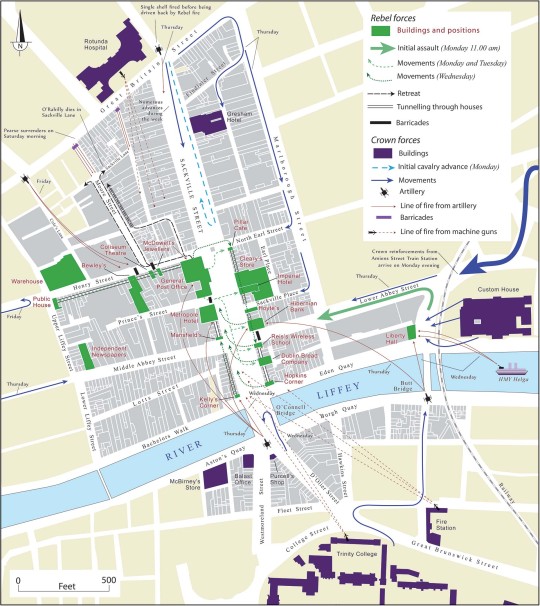
The Easter Rising, Dublin, 1916.
On Easter Monday, April 24 1916, approximately 1,250 men and women from the Irish Volunteers, Irish Citizen Army and Cumann na mBan under the command of James Connolly and Padraig Pearse seized key locations in Dublin and proclaimed an Irish Republic. The rebellion – the Easter Rising as it has since become known – ended six days later with an unconditional surrender by Padraig Pearse to British forces on Saturday, April 29, 1916 to avoid further bloodshed in the face of certain defeat.
221 notes
·
View notes
Text
The experience of [World War 1] for the thousands of [Algerian] men who crossed the Mediterranean to serve the Patrie was complex and plural. For the Europeans of Algeria, participation as full citizens alongside metropolitan troops confirmed their full membership of the nation. Their encounter with metropolitan troops exposed them to the range of cultural differences that characterised Frenchmen, convincing them of their legitimate place in the national community.8 If the experience of the European population of Algeria was one characterised by differences of culture but equality of rights and conditions, the same could not be said for indigenous Algerians. Military policy towards indigenous troops was shaped by ‘conflicting impulses’ as administrators drew on a blend of racial prejudice, paternalism, respect for difference and a rhetorical commitment to republican equality to simultaneously acknowledge, reward, discipline and degrade indigenous soldiers.9 Indigenous soldiers found themselves serving the national community without a clear indication of how their service would change their status within it.
This same tension was evident in the discourse framing indigenous participation. Throughout the war the colonial authorities had stressed the unity of Algerian society behind the war effort. Echoing official discourse in the metropole, they celebrated the existence of a specific Algerian form of the Union Sacrée. Just as political leaders asserted that society in the metropole was united in the defence of the Patrie across boundaries of class, religion and political allegiance so too elites in Algeria, both European and indigenous, declared that society in the colony stood as one, with distinctions of race or citizenship status supposedly forgotten in the face of the existential threat to the French nation.10 In fact, in both cases, discontent with an officially imposed unity bubbled away under the surface of wartime society, occasionally boiling over in the form of industrial unrest or mutinies in the metropole or open armed rebellion in the colonies, as was the case in the brutally-repressed anti-conscription insurrection in the Sud-Constantinois region of Algeria in 1916. Nevertheless, official discourse sought to obscure these fissures in the edifice of the Union Sacrée on both sides of the Mediterranean. [...]
In the aftermath of the Armistice, the prospect of colonial reform as a compensation for the indigenous community’s wartime service contributed to the dissolution of the Algerian Union Sacrée among the colony’s political elite.12 The uneasy wartime truce between the leaders of the European settler community and the emergent indigenous Algerian educated elites soon fell apart as both sides struggled to impose their rival visions of a just postwar colonial order. The bitter debates that rallied European conservatives against indigenous elites and their progressive European allies not only scuppered any radical reform of the colonial order but also fatally undermined the public discourse of cross-community fraternity that had underpinned Algeria’s colonial Union Sacrée.13 Indeed, whether such transcommunal unity had ever existed in concrete terms on the ground in the colony during the war is difficult to assess given the lack of non-elite indigenous accounts from the period. [...] [B]oth politics and daily life in the colony largely returned to the pre-war status quo premised on the racial hegemony of the Europeans [.]
Dónal Hassett, "A Tale of Two Monuments: The War Memorials of Oran and Algiers and Commemorative Culture in Colonial and Post-Colonial Algeria." In Commemorating Race and Empire in the First World Word Centenary, pp. 151-68.
35 notes
·
View notes
Text
Have I mentioned this before?
There’s a tonne of guns in Ireland……illegal guns. 1905 & 1916 Rebellions, the War of Independence, the Civil War and then the Troubles. Loads of illegal guns in Ireland.
Very few gun deaths though.
Super…like ridiculously hard to get a gun license even just for a hunting shotgun.
And this is the important one; Because of the whole post-independence Civil War and the Troubles thing, crimes committed using a gun get you waaaaay more shafted.
Loads of illegal guns knocking about, but because of restrictions on legal ownership and harsher punishment for their use in the commission of crimes, the gun murder rate and also the overall murder rate is way lower?
Shocking.
7 notes
·
View notes
Text
History of Harold's Cross, Dublin
One explanation of the origin of the name Harold’s Cross is that it is derived from the name given to a gallows, which had been placed where the current Harold’s Cross Park is situated. Harold’s Cross was an execution ground for the city of Dublin during the 18th century and earlier. In the 14th century the gallows there was maintained by the Archbishop.
Harold’s Cross stands on lands which…
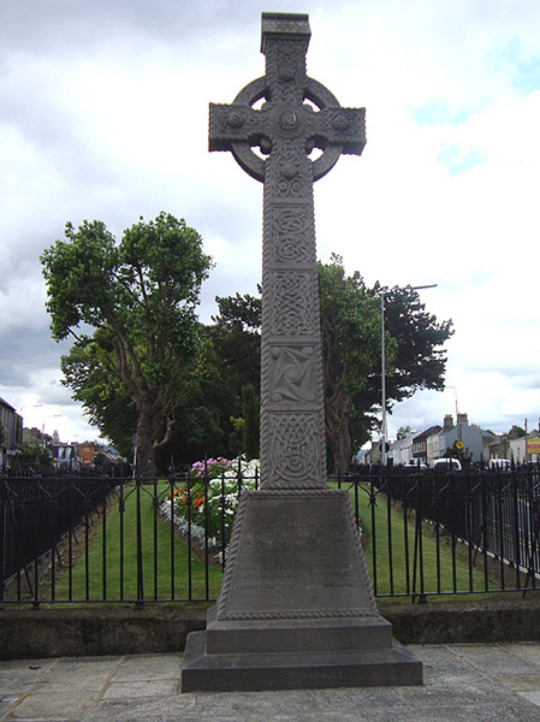
View On WordPress
#1798 United Irishmen Rebellion#1916 Volunteers#Archbishop#Dublin#Gallows#Harold&039;s Cross Green#History#History of Ireland#Ireland#Irish History#Kimmage#Mount Argus Church#Padraig Pearse#Rathfarnham#Rathmines#Robert Emmet#Sarah Curran#The Pale#Whitechurch
11 notes
·
View notes
Text
As a person from a country which threw off an evil empire only to descend into instant civil war followed by theocratic oppression I actually really appreciate the insinuation, in Mando S3 E3, that the New Republic isn't all that great.
'Andor' went HARD on its parallels to Irish history. An incitement to rebellion occuring at a funeral within a culture which takes funery custom very seriously is not unique to us (in fact no revolutionary process is unique to us) but it does feel very true to Irish history. Gilroy was inspired by 1970s IRA funerals in the North, or so he has said, but to me it was more reminiscent of the funeral of Jeremiah O'Donovan-Rossa in 1915, or the funerals of the early hunger strikers in the period between the 1916 Rising and the beginning of the War of Independence in 1919. These, especially the 1915 funeral wherein rebel leader Padraig Pearse gave a rousing speech which ended 'Ireland unfree shall never be at peace', are considered by historians as pivotal moments for the shift in sentiment towards the ousting of British Imperial control in Ireland.
It is so resonant, then, that like in the history of my own culture the New Republic in Star Wars shows itself to be by turns incompetent, repressive, and undeservedly smug about its own project.
This often happens in revolutions. The problems which both predate and are caused by Imperial control do not simply go away because you took down the Cogwheels or the Butcher's Apron. (For those who don't know, that's the Union Jack).
Do I hate the thought that Cassian Andor and Jyn Erso may have died for something that still wouldn't have aligned with their ideals had they survived? Of course I do. Just as I hate how James Connolly died for the same reason in the history of my own country. Do I hate the idea that my beloved Princess-Senator-General Leia Organa struggled in vain against a government that SHE WAS INSTRUMENTAL IN CREATING only to have to turn around and start rebelling again because things went to shit? Yes. I hate it. Just as I hate how my country betrayed the heroines of our revolution (Markievicz, Gonne, Sheehy-Skeffington, Lynn, Skinneder, Farrell, Ffrench-Mullen and others) by ousting them from politics and curtailing their rights. I hate these facts of history, but I love that they are reflected in Star Wars.
I love that the New Republic sucks. I love it because it feels so fucking true to life.
The sacrifices that the rebels made, both Fadó Fadó in Éireann and A Long Time Ago In A Galaxy Far Far Away, were not worthless. Their ideals were good. They absolutely should have done what they did. Empires, British or Galactic, SHOULD be overthrown. Just because my country turned into a place where Catholic clergy traumatised generations through sexual predation, unjust incarceration for moral crimes, and the stealing and sale of babies approximately three minutes after the Tricolour went up and the Union Jack came down doesn't mean that we shouldn't have rebelled at all.
The question of 'what do you do with your revolution once you've got it' should loom large over any revolution. It is evident that the maintenance of certain statuses quo just lays the ground work for the wars to come.
Star Wars onscreen usually works in broad strokes. The minutiae are largely left to the writers of the novels, and to a greater extent those of us who write fic and meta, to create and interpret. This particular broad stroke, that the New Republic maintains certain injustices from the time before, is deeply compelling and I hope it's something that the canonical story and those of us engaged in transformative practice with it can continue to explore.
#star wars#the mandalorian s3#the new republic#star wars meta#galactic musings#mando s3 e3#the mandalorion spoilers
33 notes
·
View notes
Text
Also people in dublin in 1798 🤝 people in dublin in 1916: "why are my letters a casualty of this rebellion"
11 notes
·
View notes
Photo

Happy birthday, James Connolly! (June 5, 1868)
Born in the Irish ghetto of Cowgate in Edinburgh, James Connolly became a laborer at a young age, and joined the British Army to improve his prospects. However, he developed a hatred for the institution which he would hold his entire life, and eventually deserted. Becoming influenced by the writings of Karl Marx and Friedrich Engels, Connolly came to identify as a socialist, and would become one of the leading figures in the socialist republican movement in Ireland, and a socialist theorist in his own right. In Ireland, he would become a leader in both the Irish Socialist Republican Party and the Labour Party, which he helped to found. Associated with the syndicalist current known as De Leonism, Connolly spent some time in the United States where he affiliated with the Socialist Labor Party and helped to found the Industrial Workers of the World and the Irish Socialist Federation. Returning to Ireland, he was a leader along with Jim Larkin in the Irish Transport and General Workers' Union, and continued to agitate for Irish independence and a socialist republic. He was a leader in the Easter Rising of 1916, commanding the Dublin Brigade. The rebellion was crushed, and Connolly captured, with his execution coming soon afterward. He has become a national hero in Ireland, with numerous statues and memorials erected to honor his memory and legacy. His dream of an Irish republic united in socialism remains, for now, unfulfilled.
“Revolution is never practical – until the hour of the revolution strikes. Then, it alone is practical, and all the efforts of the conservatives, and compromisers become the most futile and visionary of human imaginings.”
324 notes
·
View notes